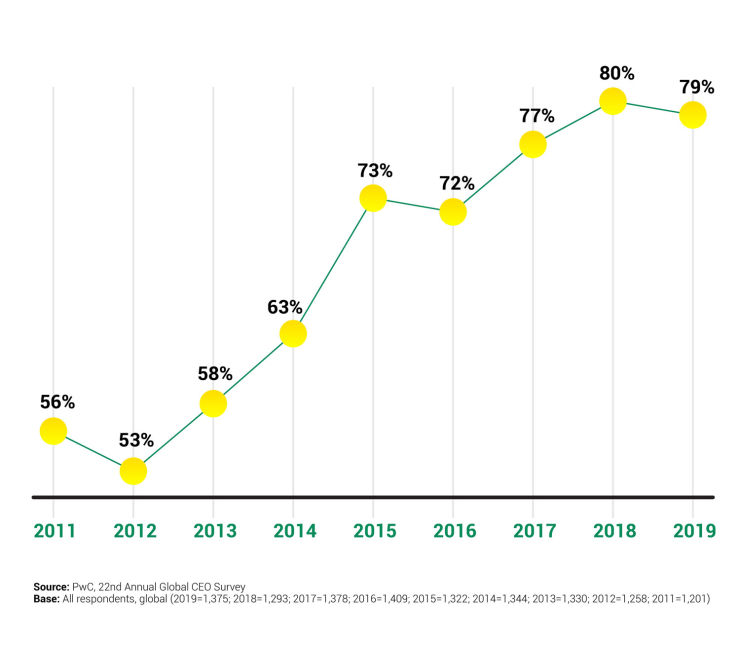
Are MBA graduates the savior for the tech industry?
Fuelled by the pandemic, the last two to three years has seen the tech industry explode with more career opportunities than ever before
Forbes denotes that technology firms have tightened their grip on global business, and got bigger than ever by occupying a record 177 spots on the of the worldŌĆÖs largest public companies. Based on these statistics, there can now be no denying that if you want to start a tech business or grow one exponentially, there wonŌĆÖt be a better time to start than now.
So, if things are so buoyant in the sector, why are we not seeing more successful entrepreneurs like IyinoluwaŌĆ»Aboyeji who co-founded , aŌĆ»US$1 billion-dollarŌĆ»organization, rising up and taking the world by storm, or the new kids on the block like or taking market share away from the big boys. ItŌĆÖs not through lack of trying. ItŌĆÖs all about a shortage of talent.
The battle lines have been drawn
The pandemic as we all know took the acceleration of tech adoption and multiplied it by 10 in the space of a year. Great you may say for adopters of tech, but what about those selling it? YouŌĆÖd think that they would be revelling in this new marketing Nirvana that they now find themselves in, but instead panic is setting in amongst the top tech companies.
According to Forbes, not only did the pandemic explode the adoption of tech, but it also exploded the tech skills shortage, leading to a .
So, who was asleep at the wheel? Everybody really. Forbes says that the shortage of tech talent is something that has not come as a surprise to the industry. Far from it. Over a decade ago more than expressed concern over the lack of talent for digital roles. By 2019, 79% had concerns and they maintain that Covid severally exposed those skills gaps.

Many would say that there is no end in sight. Lots more would beg to differ, but that all comes down to the appetite that tech organizations have for going back to school.
Learn how to develop the most in-demand skills for your future career!
Discover how you can acquire the most in-demand skills with our free report, and open the doors to a successful career.┬Ā
Plugging the tech skills shortage gap
With the right skills in scarce supply, a recent PwC survey points out that CEOs must find cost-effective ways of sourcing what they need. Previous surveys have shown CEOs exploring the idea of hiring people from other sectors ŌĆō particularly from industries that are further along the innovation journey ŌĆō and making use of ŌĆśgig economyŌĆÖ workers when appropriate. This yearŌĆÖs survey sees a shift. CEOs are now focussed on reskilling and upskilling their existing workforce.

Should this not happen, and soon, it is predicted that by 2030, in the US alone, companies could miss out on $160 billion of annual revenues. So where is the golden goose? What exactly will help to plug the skills gaps and give birth to more modern tech entrepreneurs? Many experts would argue that the saving grace for tech companies struggling with skills shortage will come in the form of just three letters, MBA.
Bloomberg says that a survey this year by GMAC showed 96% of recruiters in the tech sector planned to hire MBA graduates in 2021, up from 80% in 2019. The survey says that although many graduates will want to work at large businesses, many are also interested in starting their own. According to GMACŌĆÖs research: More than half of respondents to another survey this year said they think learning about entrepreneurship is a must-have component of an MBA program.
As the tech sector grows, Bloomberg says that schools are retooling their MBA programs to cater not only to graduates seeking jobs at the ŌĆśBig FourŌĆÖ accounting firms but also to students looking to work in Big Tech and would-be founders wanting to round out their skills and expand their networks. The shift ŌĆō which has been going on for years ŌĆō requires universities to balance traditional courses such as accounting, finance, and economics with ones on entrepreneurship, cybersecurity, and artificial intelligence. Something that progressive and next-generation universities seem to be already on top of.
Markus Perkmann, MBA academic director at Imperial College Business School in London says, ŌĆ£Tech has become the third-biggest sector pulling from ImperialŌĆÖs pool of MBA graduates, after consulting and finance. Many Imperial graduates join the likes of Amazon.com Inc. and Alphabet Inc.ŌĆÖs Google, Perkmann says. We do see a shift in the labor market, with a lot more going into the tech sector.ŌĆØ
A degree thatŌĆÖs more than just three letters!
As the technology sector matures, recruiters are placing high value on strategic, interpersonal, and decision-making skills since these are needed to drive organizational growth and innovation. These core skills are the signature of graduate management education and supports the growing trend towards colleges leaning more towards skills-based education.

Tech companies move fast, so none want the added hassle and cost of having to further train graduates to do the job at hand. But it is not just the cost of retraining that tech companies are afraid of; they are equally concerned that not upskilling workers will lead to a drop in productivity and profits.

That said, it is not just tech companies that will benefit from a competency-based university system, global economies will too as a growing number of MBA graduates are also looking to become entrepreneurs and start their own businesses.
ŌĆ£HEC Paris business school lets students spend half of their program working on an entrepreneurial idea, in addition to studying core business school courses,ŌĆØ says Andrea Masini, associate dean in charge of the schoolŌĆÖs MBA program. ŌĆ£We see more and more students joining the MBA with the idea of becoming an entrepreneur. IŌĆÖm very convinced that even if you want to be an entrepreneur, you cannot ignore the fundamentals.ŌĆØ
All good and well, but one canŌĆÖt discount the fact that an MBA needs to be more than three letters if people plan to become successful entrepreneurs. It needs to equip learners with the skills that recruiters and employers are looking for right now.
Founder and entrepreneur of The Better Leads Institute, Sid Clevinger, who holds an MBA, shared whether he believed his MBA has helped him run his business better. He believes MBAs are too theoretical, and donŌĆÖt prepare founders for the unpredictable nature of starting a business.
Are you ready to take your career to the next level?
╔½┐ŌTV's Career Path Planner takes into account your experience and interests to provide you with a customized roadmap to success.
Receive personalized advice on the skills and qualifications you need to get ahead in areas like finance, marketing, management and entrepreneurship.
ŌĆ£MBAs teach you how to run a business with no resistance and no setbacks. Getting an MBA is like using a learning template for business that doesnŌĆÖt exist in the real world. As an entrepreneur, my biggest wins were when I had a plan, and then got punched in the mouth and won, when I got blindsided or lied to, and I was still able to come out on top. My MBA did not prepare me for those moments ŌĆō thatŌĆÖs the difference I see in MBA holders and true entrepreneurs,ŌĆØ said Clevinger.
Agreeing wholeheartedly is Fadl Al Tarzi, CEO and Founder of ╔½┐ŌTV who says, ŌĆ£Too many MBA learners come out of university with a piece of paper behind their name but not much more. ╔½┐ŌTV MBAs are skills-based and have virtually no theory attached to them. ThatŌĆÖs because the predominance of tech companies look for candidates who are not merely book-qualified but skillful too. The tactical skills of leadership, management, and decision-making we have found will help graduates stand out from the crowd, tick the boxes for recruiters, and land their dream job.ŌĆØ
Companies in the tech sector are crying out for managers with digital skills and business expertise. The MBA as a route into the business side of technology is something that we are seeing more and more of today.
That should be all the motivation that prospective tech leaders of the future should come to terms with when deciding whether an MBA is right for them.
Ready to get started? Download our brochure or book a call with our ╔½┐ŌTV Advisors!

Mark is a college graduate with Honours in Copywriting. He is the Content Marketing Manager at ╔½┐ŌTV, creating engaging, thought-provoking, and action-oriented content.
Join our newsletter and be the first to receive news about our programs, events and articles.